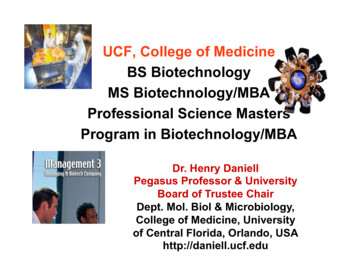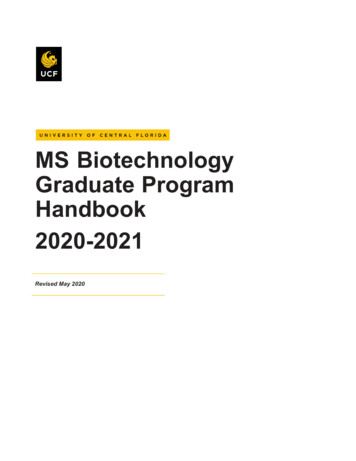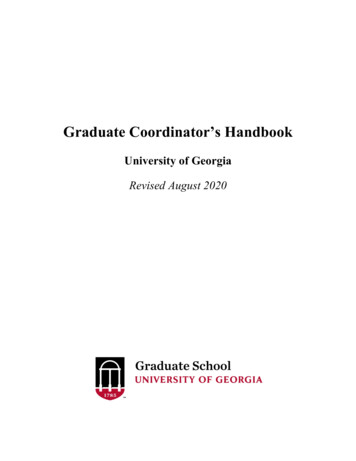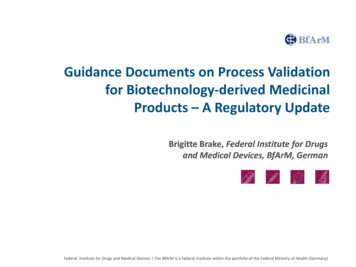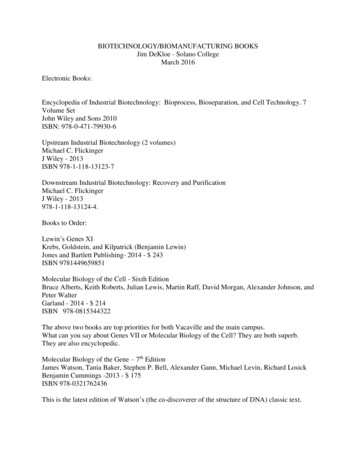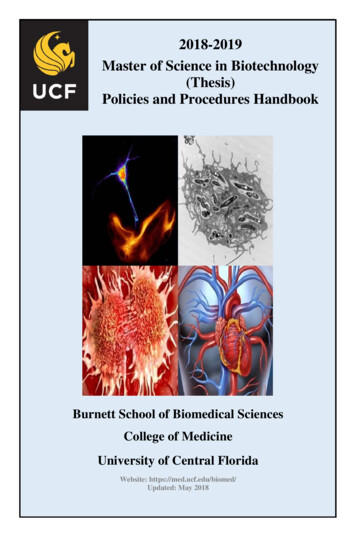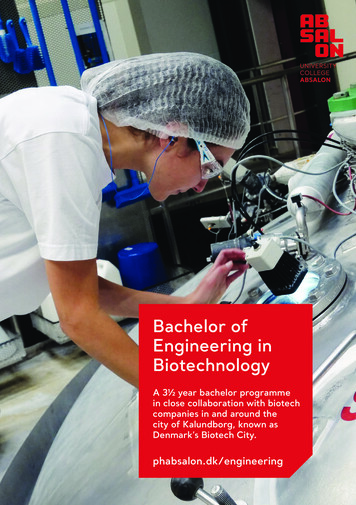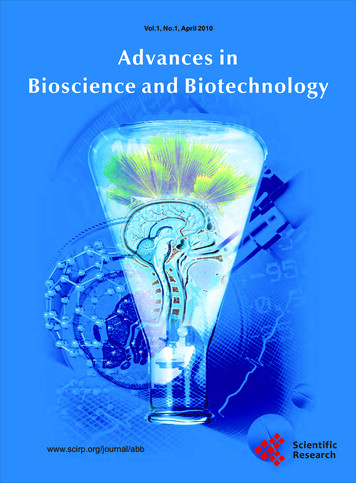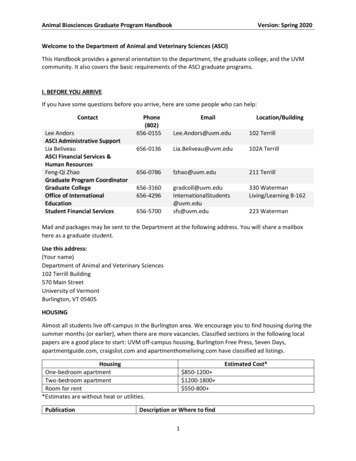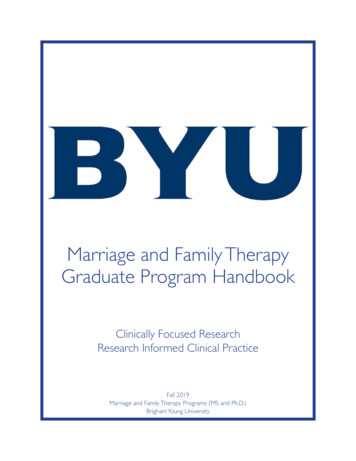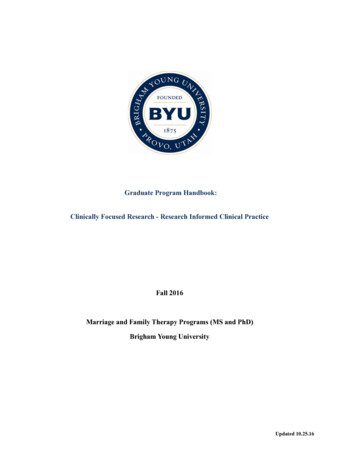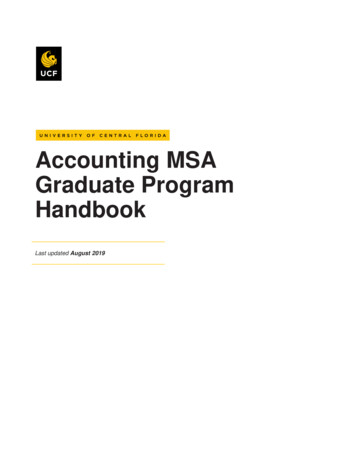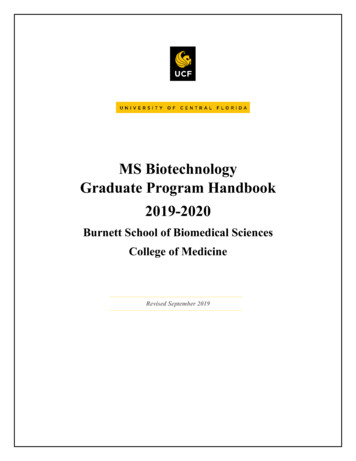
Transcription
MS BiotechnologyGraduate Program Handbook2019-2020Burnett School of Biomedical SciencesCollege of MedicineRevised September 2019
Program ChecklistRequirementDate CompletedMentor selection – September 30thThesis Committee selection – by end of Fall (official last day of class) offirst yearProgram of Study – by the registration add/drop deadline of Spring of thefirst yearMeet 6000 level course requirement – POS PlanWork with your Faculty and Committee on your Thesis ProposalSchedule your Thesis Proposal/Comprehensive Exam Meeting and notify theProgram Office of your scheduled date – by the official end of Summer (C)of your First YearEthics/Responsible Conduct of Research Workshops – Completed by the endof Spring 1st Year (Submit forms to the program office)Annual Review Committee Meeting – July 30th of each yearYear 2Year 3Pre-Defense Meeting – must be held 1 semester prior to actual thesis defenseBSBS Spring Seminar presentation by the end of your 2nd or 3rd YearSubmit Pre-Defense meeting form to program office and review GraduateStudies Thesis DeadlinesFile Intent to Graduate on your myUCF (Order your cap and gown)Schedule Conference room reservations for Thesis Defense with programofficeSubmit Thesis to Committee – Must be submitted two weeks prior to defenseSubmit Thesis Abstract for program announcement for distribution toprogram office - Must be submitted two weeks prior to defenseThesis DefensePublicationSubmit Thesis Approval Form and PDF of final thesis to program officeAttend your Graduation2
Table of ContentsWelcome to the MS Biotechnology Graduate Program at UCF!.4Program Coordinator Introduction & Welcome.5Burnett School of Biomedical Sciences Graduate Services Office.6MS Biotechnology Program Handbook.7Research Divisions.9Program Curriculum.13Suggested Timeline for Completion.15Key Programmatic Deadline.16MS Biotechnology Laboratory Rotation.17Thesis—6 Credit Hours.18Thesis Defense.20University Thesis Requirement .21Graduate Research.23Graduation Information .24BSBS Policy Statement on Academic Integrity.28Other Program Requirements.30Financial Support.34Graduate Teaching Assistants (GTA) .36Graduate Student Associations.38Professional Development.39Program Forms.40Useful Links.41Graduate Faculty Members.42MS Graduate Committee 44Facilities.453
Welcome to the Burnett School of Biomedical Sciences, MS Biotechnology GraduateProgram at UCF!We are excited that you have chosen UCF and our Graduate Program to continue your trainingand education in Biomedical Sciences. We offer a wide range of training opportunities inimportant areas of biomedical research including Cancer Biology, Cardiovascular Disease,Neuroscience and Infectious Disease and Immunology. In the past years, the Program has grownin the numbers of both students and faculty mentors. Our researchers have also experienced arapid rise in our funding for impactful research projects, as well as in our reputation foroutstanding training of the next generation of Biomedical Scientists. We look forward to havingyou as an important part of our Graduate Student Community.Griffith Parks, PhDInterim Associate Dean for ResearchDirector, Burnett School of Biomedical SciencesDirector, UCF Biomedical Sciences Graduate ProgramProfessor of MedicineUniversity of Central Florida College of Medicine6900 Lake Nona BlvdOrlando, FL 32827Office: (407) 266-7011Cell: (336) 970-1598Griffith.Parks@ucf.edu4
Program Coordinator Introduction & WelcomeWelcome to the Burnett School of Biomedical Sciences Masters of Biotechnology Program. Thisprogram is designed to give you broad knowledge and training in the scientific and practical aspects ofbiotechnology. It involves innovative, hands-on and multidisciplinary learning approaches to give youthe necessary education and training in scientific aspects of biotechnology. The courses and researchtraining required in this program are also designed to develop independent thinking, team work andcommunication skills, which are highly desirable in the biotechnology industry.As a new master’s student, you will face many new experiences that can be both rewarding andchallenging. Your studies will involve foundational coursework and laboratory research. You will havethe opportunity to work closely with faculty members from the Burnett School of Biomedical Sciences(BSBS) as well as other schools and colleges within UCF and affiliated partners in the Orlando area.The Biomedical Sciences Masters of Biotechnology Program will prepare you for a career in academicresearch, higher education or biotechnology. Course work will provide a basic grounding in relevanttopics, while hands-on research experience will be the cornerstone of your masters training. Expectationsare for you to go beyond the assigned classroom readings and use your curiosity to explore new researchtrends, building a knowledgebase to support your career as an independent scientist. Oral presentationsand writing assignments will teach you the skills needed to effectively communicate your discoveries tothe scientific community.In the first year of the program you will choose an advisor and form a thesis committee that will guideyour studies and prepare you to conduct your own research. Careful selection of a supportive advisor andappropriate thesis committee members cannot be overstated. The process of achieving a masters (Thesis)degree will demand dedication and effort that go far beyond your undergraduate experience. Theexpectations are high but also are the achievements and rewards.The program director, program coordinators, faculty and staff are available to help you succeed in theprogram. You are encouraged to interact with your peers and to participate in the intellectual life of theuniversity. You have already made the decision to enter a graduate degree program. This decisioncommits you to uphold the academic and ethical standards of UCF and the discipline of BiomedicalSciences. If you have any questions or problems, please ask for advice. We are here to help.We wish you all the best of success during your graduate experience at UCF!Office 407.823.0955 Lab 407.823.0950Burnett School of Biomedical SciencesBuilding 20, BMS 1364110 Libra DriveOrlando, FL directory/profile/dr-saleh-a-naser/Dr. Saleh Naser,Associate Director &Program CoordinatorEditor-in-ChiefWorld Journal of Gastroenterology5
Burnett School of Biomedical Sciences Graduate Services OfficeWelcome New Graduate Students,We are here and ready to answer all of your questions! Please read important information belowand let us know how we can help.The Biomedical Sciences Graduate Services Office is an integral part of ensuring your success inthe doctoral program. We are heavily involved in making sure you complete your requiredmilestones throughout your doctoral student careers.Beginning with orientation, we will assist you with course registration, program of study,seminars, committees, symposiums, dissertation defenses, and tracking your achievementsthroughout your time in the program.Moreover, we keep all parties up to date on the latest protocols andinformation for the department. We are also a critical link ofcommunication between you and our program directors and coordinators.We are available to assist you by phone, email or in person(by appointment). Please review contact information below:Website - https://med.ucf.edu/biomed/Program Emails below for your reference.Graduate Information – BSBSGradInfo@ucf.eduLisa VaughnSr. Admissions SpecialistGraduate Registration – BSBSGradRegistration@ucf.eduGraduate Forms – BSBSGradForms@ucf.eduGraduate Appointments – BSBSGradAppts@ucf.eduOffice Location Main Orlando Campus:Biological Sciences Building (BMS)Elizabeth BodeAdministrative AssistantSuite 136, 1st Floor (Ph. 407-823-4677)Office Location Lake Nona Health Sciences Campus:Tuesday & Thursday - By Appointment OnlyBurnett Building (BBS)1st Floor – Front Desk Check in with Photo IDCyrille UnicoOffice AssistantLike us on duatePrograms/6
MS Biotechnology Program HandbookMission Statement and OverviewMission: The Biomedical Sciences graduate program at the University of Central Florida,College of Medicine provides the highest quality education and research opportunities fortraining the next generation of biomedical scientists.The MS Biotechnology program enriched with graduate faculty with diverse investigativebiomedical research interest and highly qualified students who are pursuing top education andcutting edge e Graduate Faculty includes over 100 reputable scientists with established achievements indiverse aspects of biomedical sciences including metabolic disorders, cardiovascular sciences,infectious disease, neuroscience, cancer, nanoscience, biomedical engineering, drug discovery,and much raduate-faculty/.Our students are recruited from outstanding programs from all over the United States and over18 other countries. They are supported by competitive scholarships and prestigious fellowships.Our students receive top tier education, rigorous training in basic and clinical research,outstanding mentoring, and lifelong professional development. They become well trained inresearch and regulations while conducting experiments involving the use of human subjects andanimals. They learn, retain, and apply fundamental knowledge in biomedical sciences. Theygraduate from the program as scientists with excellent education, research training, and focusedcareer goals. Many go on as postdoctoral fellows, academics, scientists, and researchers.Visit: aretheynow/The curriculum of the MS Biotechnology program is continuously adapting to rapid changes intechnology, science, ongoing research, public health, and evolving microbiome and geneticdiscoveries. All students must successfully complete core courses with a focus on fundamentalknowledge in molecular and cell biology, microbiology, biochemistry, immunology,neuroscience, bioinformatics, stem cell, metabolic, cancer, drug discovery and delivery, andmore.All students are required to complete the online Collaborative Institutional Training Initiative(CITI), Responsible Conduct of Research training and four face-to-face ethics/RCR workshopscoordinated by the UCF College of Graduate Studies and the Office of Research andCommercialization. First year students are required to complete laboratory safety, radiationsafety, biosafety, and blood borne pathogen courses. Students are also required to attendPathways to Success seminar series including Academic Integrity, Graduate Grantsmanship,Graduate Teaching, Personal Development, Professional Development, and Research.7
The program administrators, faculty and staff are dedicated to educate, train, and mentortomorrows scientists and future colleagues and collaborators. Our Graduate Student Associationplays the big brother/sister role to complements the role of our faculty to help our students feel athome and succeed.MS Biotechnology DegreeMS Biotechnology students will graduate with a Master’s of Science in Biotechnology degree.Student Responsibility to Keep InformedIt is the student's responsibility to keep informed of all rules, regulations, and proceduresrequired for graduate studies. Graduate program regulations will not be waived or exceptionsgranted because students plead ignorance of the regulations or claim failure of the adviser tokeep them informed.Student Accessibility ServicesStudent Accessibility Services (SAS) views disabilities as an integral part of the rich diversity atthe University of Central Florida. To that end, we work collaboratively with students, faculty,and staff to create an inclusive educational environment for students. BSBS students withdisabilities must contact the professor at the beginning/or prior to the semester to discuss theneeded accommodations. Students who need accommodations must be registered with theStudent Accessibility Services office. For more information, please contact sas@ucf.edu or (407)823-2371.UCF Golden RuleThe Golden Rule Student Handbook is a compilation of various policies and procedures from 10different UCF departments and was specifically created to provide the answers to many of yourquestions regarding University rules and regulations. This publication attempts to define yourrights and responsibilities and give you a better understanding of your role as a member of theUCF community. http://goldenrule.sdes.ucf.edu/BSBS Program OrientationAll new graduate students are required to attend our New Graduate Student Orientation, which isheld one week before Fall classes begin. Graduate students will meet with program leaders whowill give an overview of the program choreography, guidelines, and expectations for the BSBSgraduate program. New graduate students will also attend our Welcome Colloquium,financial/contract information session and complete all program orientation requirementsincluding lab & safety and animal safety training.8
Research DivisionsDivision of Cancer ResearchResearchers in the Division of Cancer Research are on the vanguard of cancer biology,investigating: How patients’ genes play a role in their cancer risk. What causes cancer and cancer metastasis. How cancer cells communicate with the neighboring normal cells. The epigenetic changes that play a role in developing drug resistance. Discovering new ways to harness the immune system to fight cancer. Identifying new targets for companion diagnostics with treatments that reduce ancer-research/Division of Immunity and PathogenesisThe mission of the Immunity and Pathogenesis Division is elucidation of the cellular andmolecular mechanisms at the interface of infection, inflammation and immunity. Our group hasbroad interest and expertise in microbial pathogenesis, innate immunity, inflammatory signalingpathways and immunological memory.Discoveries are being translated into innovative diagnostics, vaccines, and therapeutic strategiesto improve human health.Projects are related to:Respiratory diseases (Mycobacterium tuberculosis, non-tuberculous mycobacteria,influenza, parainfluenza, respiratory syncytial virus and asthma) Sexually transmitted diseases (Chlamydia trachomatis, human papilloma virus and Zikavirus) Vector-borne diseases (Lyme disease and emerging vector borne viruses) Inflammatory diseases (Inflammatory bowel disease, peritonitis, autoimmune arthritisand /immunityand-pathogenesis/ 9
Division of Molecular MicrobiologyThe Division of Molecular Microbiology conducts basic and applied research related to bacterial,parasitic, and viral diseases that are of major public health concern. Research is focused in twobroad areas: Understanding the fundamental principles of microbial pathogenesis.Development of next-generation antimicrobial drugs.Topics of interest include HIV, tuberculosis, malaria, mechanisms of antimicrobial resistance,evolution of bacterial pathogens, genomic epidemiology, enteric diseases, toxins, anddiagnostics. Student training and development are integral components of faculty armicrobiology/Division of Metabolic and Cardiovascular SciencesThe Metabolic and Cardiovascular Research Division focuses on understanding thepathogenesis, molecular mechanisms and cell signaling of metabolic and heart diseases and tobring translational research into the clinical environment to serve our community.Major Areas of ResearchMetabolic syndrome in diabetes and agingInteractions of lipids and lipoproteins in atherosclerosisInflammation in cardiac diseases (Myocardial infarction, heart failure, atherosclerosis)Vascular and angiogenesis in cardiac diseasesBiological energy metabolism Oxidative stress, free radical and reactive oxygen species Mitochondrial alterations pathophysiology of cardiac diseases Molecular and cellular cardiology Regenerative medicine (stem cells) in heart diseases Cardiac genetic and non-genetic disease modeling using 3D printing Tissue engineering and drug toxicity with 3D printed scaffolds Cardiovascular epidemiology and public ascular/ 10
Division of NeuroscienceThe mission of the Neuroscience Division is to discover cellular and molecular mechanisms thatgovern function of the nervous system. This knowledge is then applied to expand understandingof how neurological disorders arise and may be treated.The division’s researchers are conducting cutting-edge research on: Neurodegenerative diseases (Amyotrophic lateral sclerosis (ALS), Huntington’s,Parkinson’s and Alzheimer’s Diseases)Cerebrovascular diseases (Stroke and cerebral ischemia)Traumatic brain injury and chronic traumatic encephalopathy (CTE) caused byconcussionAxonal transportation dysfunctions (Charcot-Marie-Tooth disease (CMT), Perrysyndrome, distal spinal and bulbar muscular atrophy)Sleep apneaDiabetes and aging-induced cardiac neuropathyBrain cancer such as glioblastoma multiforme (GBM) and neuroblastomaOptic nerve damageNeurofibromatosis Type 2 and schwannomatosisCancers of the head and neck including oral cancerRegenerative medicine and stem cell therapiesBrain machine interfaceInduced pluripotent stem (iPS) cellsFaculty collaborate with local physicians and UC
(BSBS) as well as other schools and colleges within UCF and affiliated partners in the Orlando area. The Biomedical Sciences Masters of Biotechnology Program will prepare you for a career in academic research, higher education or biotechnolog
